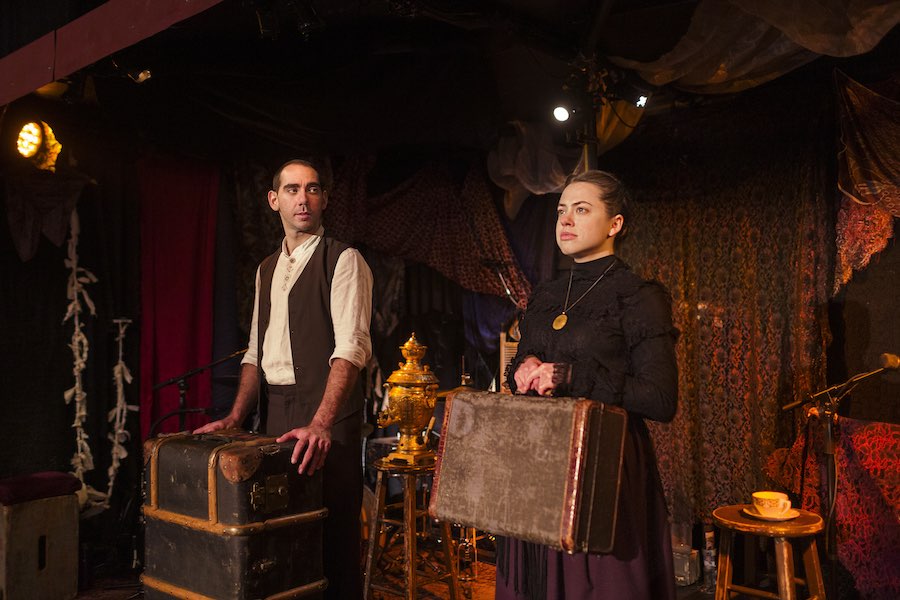“Getting a little dark?” That’s the good question that Ben Caplan, the singer/songwriter/storyteller at the heart of Old Stock, poses to the audience well into the performance at Theater J. He has just completed recounting flashbacks experienced by Chaim (Eric Da Costa) and Chaya (Shaina Silver-Baird) of the horrific trauma they endured as they separately made their way to Canada as refugees from pogroms inflicted on Jews in Eastern Europe in the first decade of the 20th century. These stories are powerful and disturbing, perhaps especially to viewers who have themselves experienced significant trauma.
Chaim and Chaya — based on playwright Hanna Moscovitch’s great-grandparents — were among the lucky ones, surviving to live in a new country that isn’t determined to kill them in their beds. Adapting to life in Canada is not smooth, though. The pair face discrimination in access to everything from movie theaters to doctors. Their marriage, shadowed by differences in how each contends with the long-term effects of their histories, is for years not emotionally close.

The darkness behind their stories is bookended by humor and hope. The meet, not cutely, in the medical examination line of an immigration center in Halifax in 1908, then again in Montreal where Chaim, enthusiastically, and Chaya, more guardedly, agree to marry. Chaim, while outwardly cheerful in his interactions with his wife, is shy, inexperienced, and painfully awkward about sex. This is reflected in one of Caplan’s funniest songs, “Minimum Intervals,” a rapidly accelerating piece about the recommendations of Jewish tradition for how often husbands should satisfy the erotic needs of their wives. Caplan tops even this with a lengthy, patter-like list of seemingly dozens of terms for having sex.
Caplan also provides a delightfully incisive take on the Bible, “Truth Doesn’t Live in a Book.” “The good book is only a lens,” he sings. “You can’t only look at the lens, you gotta look through it.” I’d like to see that line posted on more than a few church walls.
On stage, the large, bushy-bearded, Caplan is a non-stop whirlwind of what he has called “bombast, energy, [and] exuberance.” With a strong, sometimes gravelly, wide-ranging voice, and rapid, agile movement around the stage, Caplan delivers with equal conviction and effectiveness songs ranging from the polemically angry “Plough the Shit” to the quiet, tender “Lullaby,” a song of peace as much for parents as for children. “Lullaby” is a fine example of Caplan’s impressive skill as a lyricist: “And the sun will shine in the ocean tonight, and the cool of the water makes everything right. The ocean once dreamed it could shine up above, but protecting, reflecting, the sun is enough.”
In the structure of the play, it is mostly Caplan who tells the immigrant couple’s stories. Chaim and Chaya appear in often brief dialogue scenes that illustrate steps in their journey, amidst Caplan’s songs and narration. There is one important, and quite lovely, exception to this pattern. In the concluding number of the show, “What Love Can Heartbreak Allow,” a song of well-earned hope, Chaim and Chaya sing to each other for a time without Caplan’s involvement, in words adapted from the Song of Solomon. Among all the stories Caplan tells of their lives, this is their story to tell each other. It is a moment of profound love, not as romance, but as growing knowledge and reconciliation.
Old Stock is deeply grounded in Jewish tradition and the long history of persecution Jews have suffered. The characters, Caplan comments, “come from a long line [of people] preparing for a worse that usually comes. Can these people be happy, they’re so out of practice?” But the story is intentionally far more universal. Moscovitch began the project with the 2015 Syrian refugee crisis in mind. The title is a reference to a scornful comment made by former Canadian Prime Minister Stephen Harper (for folks not familiar with Canadian politics, a sort of north-of-the-border analog to George W. Bush) that immigrants were distinct from “old stock” Canadians.

The instrumental music is provided by a band including Da Costa and Silver-Baird, as well as music director Graham Scott and Jamie Kronick. Written mostly by Caplan, with participation in some numbers by director Christian Barry and others, the score is a greatly varied combination of klezmer, folk, and rock styles, and is in itself a key character in the play.
The technical side of the production works well in every respect. The lighting design by Barry and Louisa Adamson is specific, focusing attention on what matters in a given scene as well as a movie close-up. Barry and Adamson also designed the set, a shipping container, a symbol, and sometimes a means, of human cargo being shuttled around the world. The container swings open to reveal the playing area for the band and Chaim and Chaya’s dialogue scenes. Carly Beamish’s costumes are period-appropriate for Chaim and Chaya, and wildly, colorfully description-defying for Caplan.
Today’s world is one of refugees. Consider Haiti, Tigray, Yemen, Ukraine, Myanmar, Venezuela, and the flood plains of Pakistan. Climate change will create more. Caplan tells a parable near the end of the show. Suppose you’re home alone at night and someone knocks at the door. Is it someone needing help? Is it someone who may endanger you? A piece of paper is slipped under the door, the message hard to decipher. What do you do? Do you open the door?
Whatever the answer, in different times and circumstances, at the very least we can say, with the characters in this deeply affecting play, “May no harm come to you.”
Running Time: 85 minutes, with no intermission.
Old Stock: A Refugee Love Story — a touring production originated by the 2b Theater Company of Halifax, Nova Scotia — plays through September 25, 2022, presented by Theater J at the Aaron & Cecile Goldman Theater in the Edlavitch DC Jewish Community Center, 1529 16th Street NW, Washington, DC. Purchase tickets ($44–$84) online or by calling the ticket office at 202-777-3210.
The program for Old Stock: A Refugee Love Story is online here.
COVID Safety: All patrons in the Goldman Theater are required to wear masks covering their nose and mouth. Only performers and guests invited onstage may be unmasked. Masks are optional but encouraged in the Q Street and 16th Street lobbies, hallways, and other public spaces. For more information, visit Theater J’s COVID Safety Guidelines.
SEE ALSO:
A refugee story set to Jewish wedding music? Christian Barry explains. (feature interview by Ravelle Brickman)





